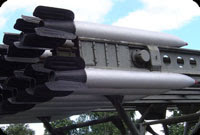 Iran brushed aside accusations by France, Britain and the United States that its banks were involved in illegal nuclear activity.Earlier this month, Britain, France and the US warned in a letter to the Security Council against 'Iran's continued attempts to conduct prohibited proliferation-related activity'.
Iran brushed aside accusations by France, Britain and the United States that its banks were involved in illegal nuclear activity.Earlier this month, Britain, France and the US warned in a letter to the Security Council against 'Iran's continued attempts to conduct prohibited proliferation-related activity'.The three Western countries argued that Iranian banks were trying to get around sanctions by covertly conducting transactions. Iran rejected the charge in a letter to the Council on Friday, saying Iranian banks 'have never been involved in any illicit activities including in non-peaceful nuclear activities -- simply because there are no such non-peaceful nuclear activities in Iran'. It termed the allegation that the banks were involved in illegal activities as "baseless and absurd," saying it was "a malicious attempt to unjustifiably dissuade others from dealing with Iranian banks..." "The attempt by the three countries to restriction of the activities of the Iranian banks is intended not only to exert undue pressure on the Iranian government, but also to disrupt the banking and financial affairs of millions of their clients," Iran's deputy ambassador Mehdi Danesh-Yazdi said in the letter.












